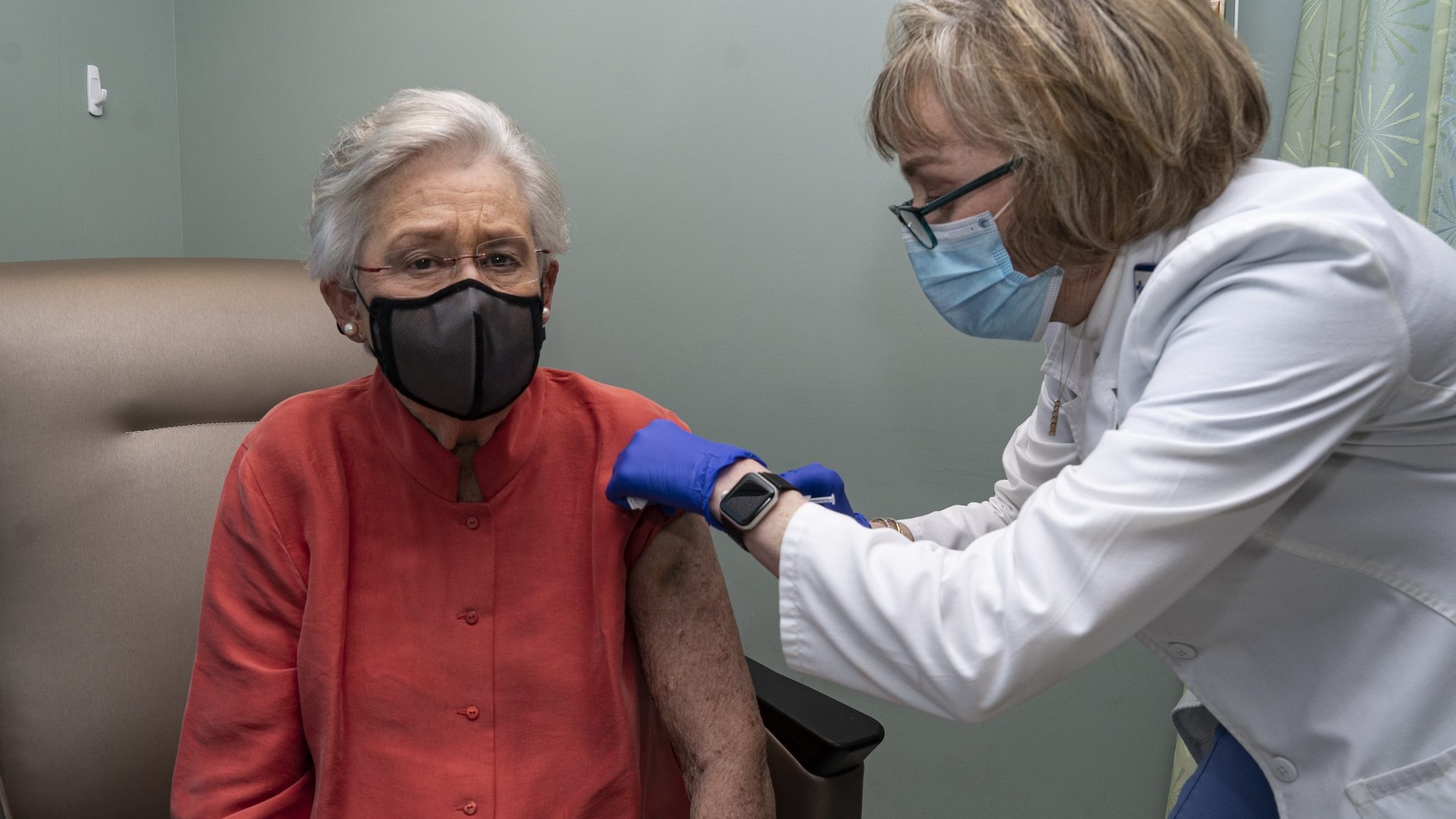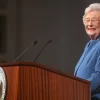Alabama Gov. Kay Ivey and two top state health officials on Monday all received first of two doses of the Pfizer vaccine at a Montgomery hospital.
“Feel as you will, but by George, we need everybody to be immune to this thing and to step up,” Ivey said outside of Baptist Medical Center South in Montgomery on Monday, according to The Montgomery Advertiser. “That’s the reason the three of us are here today to demonstrate that you can have confidence in the vaccine and its effectiveness.”
“The sooner the better. Let’s get on with this thing,” Ivey said, according to the newspaper.
Ivey addressed a question about concerns children have regarding whether Santa will be able to deliver presents this year because of COVID-19, according to The Montgomery Advertiser.
“When I talked to Santa, he assured me he’d wear his mask and if all the children were sound asleep in their beds at night he could safely deliver their gifts at the right distance. … Santa also told me that the children of Alabama had been really good this year, and I agree that they’ve been real troopers through this whole ordeal,” Ivey said, according to the newspaper.
Speaking outside the Baptist Medical Center South in Montgomery, Alabama state health officer Dr. Scott Harris, who was one of the three to receive the first shot, thanked Ivey for taking the vaccine to help encourage the public to do so.
“I sincerely appreciate the governor standing up and doing what I think shows a tremendous amount of leadership. We need people to understand that we’re not just telling people to do it. We’re willing to do it ourselves, and I appreciate her doing that,” Harris said.
Harris said there’s been much skepticism, and some legitimate questions, about the vaccine in some quarters.
“We believe that it is a safe and effective vaccine,” Harris said. “We have analyzed as much as we can about the data and believe that it’s appropriate for people to use, and so we want to make a statement by getting our vaccine publicly.”
Harris encouraged the wider public to be patient for vaccines to become more broadly available to larger segments of society. Currently, the Alabama Department of Public Health is still in the earliest stages of vaccinations, and are doing so only for health care workers and nursing home residents and staff. Nursing homes could begin vaccinations next week.
“Please be patient,” Harris said. “There’s still not nearly enough vaccine to go around.”
“Our phase one A population are going to be healthcare workers and nursing home residents and that’s close to 325,000 or 330,000 people. We’ve only had 41,000 doses delivered so far. That was last week with the Pfizer product,” Harris said “And remember, that’s only shot one. All these people have to get shot two.”
Harris said thus far the state has given those first doses to approximately 12 percent of Alabama’s health care worker force. If the Centers for Disease Control and Prevention signs off on a recommended phase one B in the next couple of days, as is predicted, the next groups to receive vaccinations will be seniors aged 75 and up, certain essential workers, including teachers, daycare workers, manufacturing workers and all first responders, Harris said.
Asked how long it will take to move through the various phases, Harris said that will depend on several things, including when the state will receive the next vaccines. Alabama’s initial shipments of the Moderna vaccine are expected to begin on Monday, according to ADPH. Harris told APR on Friday that ADPH learned from the federal government two days earlier that the state would be getting 19,500 fewer doses of the Pfizer vaccine in an expected second shipment this week.
Harris said the next vaccine will likely be the Johnson & Johnson vaccine, which could come to market in February.
“That’s going to be only a one shot vaccine, which helps a lot,” Harris said. “It also depends on what the effectiveness of that product is. If it’s 70 percent we might see disease transmission go down a lot more, compared to if it’s only 40 percent.”
Harris said the timing of the different phases also depends upon how many people decide to accept the offer and get vaccinated.
“If lots of people opt not to take it, then I think we’re ready to move to one B pretty quickly,” Harris said. “Because we’re not going to sit on the vaccine waiting for people to show up if they’re not going to show up.”
“We hope they’re going to show up, and I would say our experience so far has been health care workers are very supportive of it, and have been willing to take it,” Harris said.
ADPH’s chief medical officer Dr. Mary McIntyre also received her first dose of vaccine along with Ivey and Harris on Monday, and said afterward that she’s been working with community leaders for months.
“I’m getting daily emails, text messages, about people worried that the vaccine is not safe,” McIntyre said. “I think it’s extremely important as leaders to actually demonstrate that this vaccine is safe, that we have no problem with taking the vaccine.”
McIntyre also said it’s important for the public to know that there were no safety shortcuts in how the vaccines were developed and approved.















































